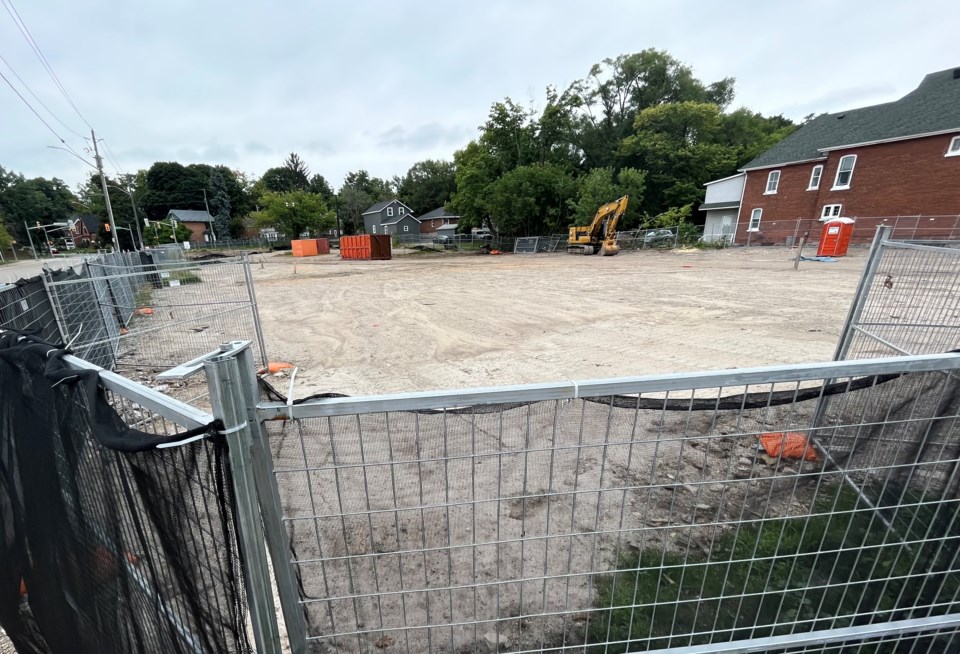A mostly rental residential project in downtown Barrie is getting a break on its development charges.
City council gave final approval Monday night to grant the deferral — estimated at $7 million to $10 million, at a cost of as much as $500,000 — for a planned project on Owen Street, between Worsley and McDonald streets, comprised of 273 residential units, of which 223 are to be rentals and 50 condos for owner-occupation.
The motion which passed was that city staff enter into an agreement with The Junction Group on behalf of its client, developer Traditions Senior Housing, to defer the portion of the development charges related to the proposed rental units, excluding the owned units, for a period of three years, or upon occupancy, whichever comes first, contingent upon the developer applying for building permits within 120 days of this agreement. And that for the term of the deferral, the developer shall pay interest to the city on the deferred amount at a rate of 50 per cent of the city’s five-year moving average weighted cost of capital.
This type of deferral is allowed according to the Development Charges Act, but it must be from council, not city staff.
Coun. Clare Riepma said this would not set a precedent.
“And it would still incentivize the developer to build because we really need the housing stock,” he said.
“Too often things don’t get built,” said Coun. Jim Harris, “so it’s important for us to incentivize this project.”
Deputy Mayor Barry Ward has noted the Ontario average for buildings that are built specifically to be rented is 47 per cent per cent of all rentals. Barrie’s figure, according to Stats Canada, is 22.7 per cent.
For this development, the amount of the deferral depends on the type of residential units built, which remains unknown. Current development charge rates are $30,111 per bachelor and one-bedroom unit, and $42,886 per apartment with two or more bedrooms.
Development charges are designed to recover the capital costs associated with residential and non-residential (commercial, industrial, institutional) growth within a municipality from developers, so that existing residents don’t have to foot the bill.
Only Coun. Gary Harvey voted against the motion, as he was concerned about the precedent it could set.
Cathy Colebatch made a deputation to council opposing the deferral.
“Why should large developers use the City of Barrie as a banking option?” she asked. “Council can do better.”
Colebatch was also concerned that since this council was lame duck, it should not be making decisions of this financial scale. This council became lame duck when nominations closed Aug. 19 for the city election.
City clerk Wendy Cooke said this deferral was not out of order.
“It is an unusual situation we have not had before,” said Mayor Jeff Lehman. “This is not a new project and it’s not tax money. It’s development charges to be paid at a later date.”
Lehman has said he hopes the new council, to be elected Oct. 24, doesn’t allow this to become a precedent.
But Lehman has also said this is a good deal for the city, too.
If the entire building is rentals, the developer can defer DCs for as long as five years under new Ontario legislation, he said. The reason this development isn’t getting an exemption is because it has 50 condo units, and 223 purpose-built rentals.
Lehman noted the average sold price of all homes in Barrie is down 13 per cent on the year, and at the same time Statistics Canada reports a 22 per cent increase in construction costs.
If this developer didn’t have the 50 condo units in there it could defer the DC payment for five years and the city would be taking a $2.5-million interest hit. So there’s value in giving this developer one-fifth of what it would have received if all the units were rentals.
But there are other financial implications.
The city’s 2019 development charge background study says, during the next five years, the city is relying upon the collection of $860 million to fund Barrie’s growth plan.
As of July 31, 2022, the balance in the city’s development charge reserve was $50 million. However, including existing commitments, the city’s development charge reserves are forecasted to be over-committed by $145 million at the end of 2023.
Staff say deferring the collection of DCs puts additional pressure on city reserves. On a consolidated basis, the total city reserves are forecast to be over-committed by $71.3 million at the end of 2023.



